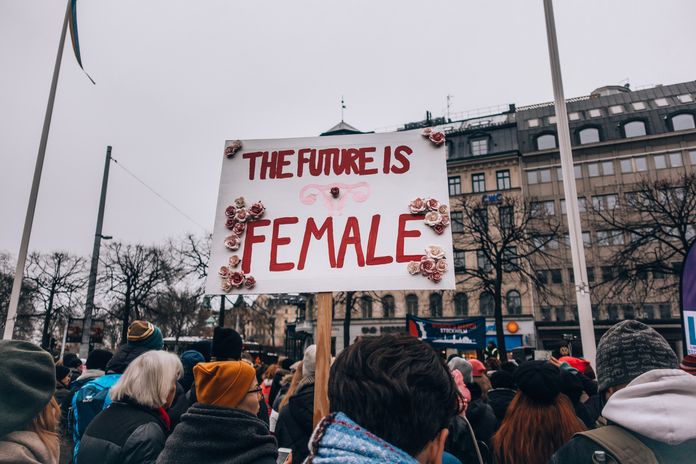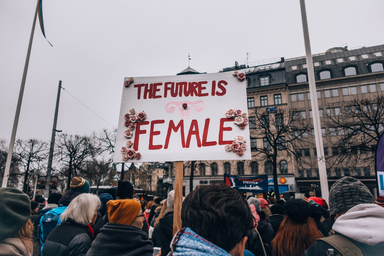Edited by Olivia Spahn-Vieira
Finally, after decades of stubborn persistence, we are seeing more and more women enter the political arena. There is a generation of young girls growing up with a whole range of female political role models to aspire to, and that is a sure sign of progress.
However, as we prove that we’re here to stay in the historically men’s club that is politics, it is important to reflect on the images of the women we see. What do they teach us about the correlation between success and femininity? This question struck me as I rewatched the opening scene from Knock Down the House on Netflix (what a great watch, I highly recommend it!), where we see AOC putting on her makeup. “For men, you either wear a suit or a light-colored shirt with slacks”, she says, dabbing concealer under her eyes.
Simply because women have not been included and assimilated in politics until recently (and the road is longer and tougher still for womxn of color), a similar “template” has not yet been created for women.
How much lipstick is too much?
How softened should your eyeshadow be?
Should you wear a dress, or opt for a Clinton-style pantsuit?
Or should you present yourself as masculine as you can, for reasons beyond your control?
Early women in politics faced this question. When we look at Margaret Thatcher, Jeanne Kirkpatrick, Indira Gandhi, and even Hillary Clinton, we can see a trend of female political trailblazers who shed certain aspects traditionally associated with “womanhood”. These women are pioneers, but what do we do when even the women who do make it in politics, suddenly shed femme ideals and habits?
Indira Gandhi was often referred to as “the only man in her cabinet” and Margaret Thatcher has famously said that she was more proud of being the first British PM with a sciences degree than to be the first female PM. Thatcher even underwent training to lower her voice. In a study comparing Hillary Clinton’s linguistics between 1996 and 2014, results showed that she began talking more “like a man”, employing language habits that are often associated with men.
This is not to condemn these women. In fact, we should recognize that to be taken seriously or even just to fit in in a room of men, these women probably had to adjust their mannerisms and the characters they project. Traditionally masculine characteristics, such as self-assuredness or stubbornness, were markers of political success, and to get to where they needed to go, women did what was they had to: they had to adapt.
But today, as we see more women engage politically, we should reflect on what it means to be feminine in politics and to project femme characteristics and images. This is not to restrict women to certain stereotypes, but more to restate that there is power in being feminine if one chooses to present themselves as such. This is proven by Jacinda Ardern, and her powerful speech in response to the Christchurch attacks, which emphasized compassion, and not fearmongering.
Characteristics traditionally associated with women, such as passion and empathy, could transform the political arena for the better. But for most of human history, traditionally feminine characteristics have been seen as weaknesses to overcome in order to succeed. To necessitate that women must and can only be successful in politics if they are in imitation of man is not enough.
This leads us to today. Recently, AOC did a ‘daily makeup’ routine for Vogue’s YouTube channel. To see her discussing the pink tax and her Congress lifestyle while she puts on her favorite red lipstick and shares her makeup tips was empowering, to say the least.
However, on the other hand, we have stories like those of British MP Tracy Brabin, who was slut-shamed because she wore an off-shoulder dress to Parliament. How is it that we can accept women in politics, but not femininity?
The political arena for women today is changing, the way it did when women just started entering positions of power. Women have an important place in politics and it is important that women can be themselves, in whatever form that may be, for women’s issues – such as the pink tax – to truly reach the political arena.
The truth is that the current political system penalizes femininity, and this is applicable for most systems and sections across society. To overturn this trend is to stop looking at feminine qualities as weaknesses, and instead as strength. This, in turn, can only be achieved as more women enter politics, normalizing and encouraging femininity. And honestly? I think politics could use some compassion and empathy and lipstick.


